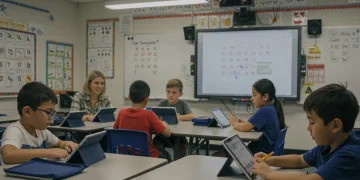GCSE reform: What it means for students and schools

The GCSE reform emphasizes critical skills, integrates technology for personalized learning, and shifts assessment focus toward final exams, preparing students more effectively for future academic and career challenges.
GCSE reform is shaking up the educational landscape in the UK. With significant changes on the horizon, it’s essential to understand what they mean for students and schools alike. Are you prepared for the shifts in assessment and curriculum?
Understanding the GCSE reform
Understanding the GCSE reform is essential for students, parents, and teachers alike. These changes aim to improve the education system and better prepare students for future challenges. As we break down the reform, you’ll see how these updates can impact learning and assessment.
Key Aspects of the GCSE Reform
The reform introduces a range of changes in how subjects are taught and assessed. Some significant changes include a shift towards more rigorous assessments and a focus on core knowledge. This means students will face new challenges but also gain valuable critical thinking skills.
- Increased emphasis on exams rather than coursework
- More detailed syllabi to cover essential topics
- Stricter grading criteria
- Greater support for teachers and students during the transition
Additionally, the GCSE reform encourages a deeper understanding of subjects. It’s not just about passing exams; students will develop skills that will serve them well in higher education and beyond. This approach encourages learners to engage critically with the material.
Impact on Learning
With these changes, students need to adapt to new teaching methods and assessment styles. This can initially be overwhelming, but it also opens up opportunities for richer learning experiences. For instance, students are encouraged to collaborate more and participate actively in their education.
As schools implement these reforms, they will provide resources and support systems to help students adjust. Teachers will have training to ensure they are well-equipped to guide students through the new requirements. Parents can also play a role by staying informed and discussing these changes with their children.
Key changes in the curriculum
Key changes in the curriculum are central to the GCSE reform. These updates aim to enhance the educational experience by ensuring students are well-prepared for the future. It’s important to understand these shifts as they significantly impact what students learn.
Curriculum Updates
The new curriculum emphasizes a more in-depth understanding of subjects. This approach encourages students to engage with material critically, rather than just memorizing facts. Students will encounter a curriculum that pushes them to think more creatively and analytically.
- Inclusion of more modern topics and skills
- Emphasis on interdisciplinary learning
- Stricter requirements for practical assessments
- Focus on critical thinking and problem-solving skills
Furthermore, the reforms have adjusted the balance between theoretical and practical components. Students will explore various subjects through a hands-on approach, allowing them to connect classroom learning with real-world applications. This change promotes greater interest and participation among students.
Broader Subject Choices
With the reforms, students now have access to a wider array of subjects. This flexibility enables them to tailor their educational paths according to their interests and strengths. Such options help to motivate students and contribute to a more engaging learning environment.
For instance, students can choose from subjects such as technology, arts, and sciences, enabling them to develop a comprehensive skill set. This variety not only keeps students engaged, but it also prepares them for diverse career paths. In turn, schools are adapting their resources to foster these broader choices, ensuring students can explore their passions.
Impact on student assessment

The impact on student assessment due to the GCSE reform is significant and multifaceted. These changes aim to create a fairer system to evaluate student performance while emphasizing a deeper understanding of subjects.
Changes in Assessment Format
One of the major shifts involves the assessment format. There is now a greater focus on final exams over continuous assessment, which means that students must prepare for a single, comprehensive test at the end of their courses. This change encourages students to revise material consistently and enhances their study skills.
- Exams will cover a broader range of topics found in the new curriculum.
- There is reduced reliance on coursework, impacting how students manage their time.
- Enhanced emphasis on critical thinking and problem-solving in assessment.
- New grading scales that reflect a more detailed assessment of student performance.
The reforms also introduce new guidelines for grading, which require students to achieve a higher level of understanding to attain top marks. This necessitates more rigorous preparation and encourages students to engage deeply with the material.
Benefits of the New Assessment Approach
The shift in assessment dynamics brings several benefits, including better preparation for future academic challenges. Students will learn to perform under pressure, a crucial skill for higher education and the workplace. Furthermore, they will be equipped with the skills to apply their knowledge in practical situations, which is essential in today’s world.
Additionally, teachers will receive ongoing training to help them assist students in this transition. Workshops and resources will be provided to ensure that assessments not only test knowledge but also foster growth and improvement. As students adapt to these changes, they will develop resilience and adaptability, qualities that are invaluable in all areas of life.
How schools are adapting to the reform
How schools are adapting to the GCSE reform is a crucial topic for educators, parents, and students alike. The changes in curriculum and assessment have prompted schools to take proactive steps to ensure smooth transitions and effective learning experiences.
Training for Teachers
One of the primary strategies schools are implementing is providing extensive training for teachers. Educators are focusing on understanding the new curriculum and assessment methods. Workshops and professional development sessions also help teachers learn how to engage students effectively.
- Collaborative training sessions among faculty members
- Access to resources that explain the reform in detail
- Incorporation of technology to enhance teaching methods
- Opportunities for teachers to share best practices
By enhancing their skills, teachers can better support students as they navigate these changes. This focus on professional growth fosters a more effective learning environment for everyone.
Curriculum Adjustments
Schools are also adjusting their curricula to align with the new requirements. This means integrating more hands-on learning experiences and project-based assignments. Such methods allow students to apply their knowledge in real-life situations, encouraging deeper understanding.
Additionally, curriculum designers are considering student feedback to create more engaging lesson plans. This adaptability makes learning more relevant and enjoyable, helping students connect with the subject matter. As schools implement these adjustments, the aim is to create a dynamic learning environment that meets students’ needs.
Communication with Parents and Students
Effective communication is vital in this transition. Schools are reaching out to parents to inform them about the changes and how they affect their children. Regular updates through meetings, newsletters, and online platforms help ensure that everyone is on the same page.
In addition, actively engaging students in discussions about the reforms encourages them to take ownership of their education. Schools are providing workshops that allow students to voice their concerns and questions, fostering a community approach to learning.
Future implications for education
The future implications for education resulting from the GCSE reform are significant and far-reaching. As the education landscape evolves, it’s essential to consider how these changes will shape student experiences and prepare them for a rapidly changing world.
Increased Focus on Skills
One of the most notable implications is the increased emphasis on critical skills such as problem-solving and analytical thinking. Students will need to adapt to a learning environment that encourages collaboration and creativity. This focus prepares them for future careers, where these skills are highly valued.
- Employers seek graduates with strong problem-solving abilities.
- Collaboration fosters teamwork, an essential part of many jobs.
- Creativity is necessary for innovation in various fields.
- Adapting to changes in technology will be crucial.
By prioritizing these skills, the education system aims to create well-rounded individuals equipped to face the challenges of the future.
Technological Integration in Learning
Another important implication involves the integration of technology in the classroom. As educational methods change, students will have more access to digital tools that enhance their learning experience. Technology will provide opportunities for personalized learning, enabling students to progress at their own pace.
In classrooms of the future, you may find virtual reality simulations, interactive software, and online resources that support diverse learning styles. This integration helps ensure that students are not only well-versed in their subjects but also digital natives ready for the modern workforce.
Global Competitiveness
As educational standards rise, the UK education system will become more competitive on a global scale. The GCSE reform aims to elevate the quality of education, making UK students stronger candidates in international job markets. Increased rigor and relevance in the curriculum equip students with the knowledge and skills they need to excel.
This competitiveness fosters innovation and motivates educational institutions to continually improve. Students will benefit from a robust system that prioritizes high standards and effective teaching methods, better preparing them for their future endeavors.
The concluding thoughts around the GCSE reform highlight its importance in shaping the future of education. As students adapt to new assessments and curriculum changes, they will acquire vital skills that meet the demands of today’s world. Schools are making efforts to provide effective training for teachers and integrate technology in classrooms. Moreover, by focusing on critical thinking and collaboration, the education system prepares students for competitive job markets. Overall, the GCSE reform not only enhances learning but also paves the way for a brighter future for students.
FAQ – Frequently Asked Questions about GCSE Reform
What is the main purpose of the GCSE reform?
The main purpose is to enhance education quality by focusing on skills like critical thinking and problem-solving.
How will the assessment process change for students?
The assessment will emphasize final exams over continuous assessment, encouraging consistent study and engagement.
What role does technology play in the new curriculum?
Technology is integrated to provide personalized learning experiences, helping students learn at their own pace.
How are schools preparing teachers for the changes?
Schools are offering extensive training sessions and resources to equip teachers with the knowledge to support students during the transition.





